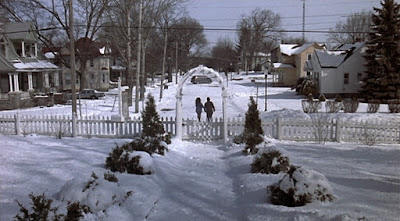- In exciting stories like Speed, this is often the moment when the hero and heroine take a breather and confirm that they really do care about each other, which often results in a first kiss.
- The surviving heroes of The Great Escape get dragged back to prison, content in the knowledge that they’ve caused a huge distraction.
- Many comedies, like Date Night, wrap up the dilemma (the marriage problems, in this instance) in a quiet scene just after the climax, which is fine.
- In movies like Rear Window, we see that the underlying dilemma (the different interests of Kelly and Stewart) has not been resolved at all, though the climax brought about a temporary truce. This can work, too.
The 40 Year Old Virgin | YES, he consummates at his wedding. There’s even a nice moment where he kicks a floor waxer out of their suite, showing his newfound assertiveness. |
Alien | YES, she gives a matter-of-fact unapologetic account of blowing up the ship, then goes to sleep with the cat. |
An Education | YES. She’s happy at Oxford, with a new boy, pretending that she’s never been to Paris. |
The Babadook | YES. It’s half-resolved/half-succumbed-to. It’s interesting that some behaviors are reversed (She talks about her husband and let’s others do so) but some aren’t, (the basement is still verboten, he son is still violent) |
Blazing Saddles | YES. He gives a speech then rides off into the sunset with the Waco Kid. |
Blue Velvet | YES. he’s embraced his parent’s idyllic life and possibly married Sandy, but we see the Robin eating the beetle and we have to wonder if he’s crushed or absorbed the evil, which are two different ways of reading that image. |
The Bourne Identity | YES. he tells her that he has no ID and smiles. |
Bridesmaids | YES. She enjoys the wedding, bonds with Lillian, accepts the cop’s love. |
Casablanca | YES. this time he stands up to the Nazis, then he goes off to join a Free French garrison in Braziville with Louis. |
Chinatown | YES. There’s just a brief moment after the finale, when he’s told “Forget it, Jake, it’s Chinatown.” |
Donnie Brasco | YES. His family accepts him but he’s disgusted by his medal. |
Do the Right Thing | YES. He talks to Sal the next morning. |
The Farewell | YES. She returns home to New York, feels overwhelmed, then stops on the street and shouts “Ha!”, which she refused to do before. We then find out that the grandma is still alive six years later. |
The Fighter | YES. Interview, Dicky says, “He put Lowell back on the map.” Micky says “We”. “Who’s the pride of Lowell now? Right here.” Points at Micky. “I gotta go.” |
Frozen | YES. She’s happy in love, able to live outside the castle, and reconciled with her sister. |
The Fugitive | YES. Kimble saves Gerard this time. Gerard also has reversible behavior: “Don’t tell anybody.” |
Get Out | YES. He rediscovers peace-making and chooses not to choke Rose to death (but Peele points out that he ultimately leaves her to die alone in the road like his mother died). Rod delivers the moral: “I told you not to go in that house.” Chris presumably agrees. |
Groundhog Day | YES. Succumbed to happily: he says “Let’s live here.” |
How to Train Your Dragon | YES. He is accepted by the village and is physically transformed. |
In a Lonely Place | YES. he watches her walk away and declares himself dead inside. |
Iron Man | YES. He tries again with Pepper, but fails, and then tells the world who he is. |
Lady Bird | YES. She goes to church and then calls her mom and leaves a message admitting that she loves Sacramento and her mom. |
Raising Arizona | YES. They send gifts to Nathan Jr. as he grows up. Maybe they’re able to have kids, or maybe that’s just a dream. |
Rushmore | YES. he introduces his real father to everyone, and his selection of song “I wish that I knew what I know now, when I was younger,” lets us know that he’s learned. |
Selma | YES. Johnson certainly shows how much he’s changed with his “We shall overcome” speech. Has King changed? He’s certainly wearier and bruised, and feeling more guilty about the deaths. We see onscreen graphics telling us what happened to everybody. |
The Shining | NO. an ambiguous final scene was cut out, leaving us with a quick cut to black as soon as they get away. |
Sideways | YES. He drives north and knocks on her door. There’s no reversible behavior…they could have ended with him drinking merlot to show he’s changed, but that would have been too on the nose (no pun intended.) |
The Silence of the Lambs | YES. She says lambs stopped screaming. |
Star Wars | YES. He’s now a celebrated hero. |
Sunset Boulevard | YES. Earlier in the climax, when he finally has the strength to resist Norma, even when she threatens suicide. |




No comments:
Post a Comment